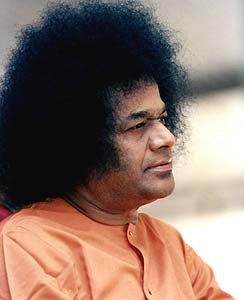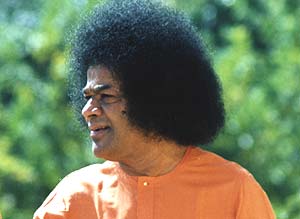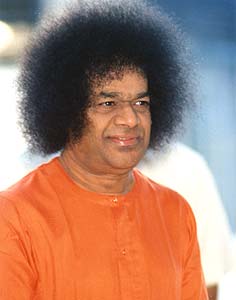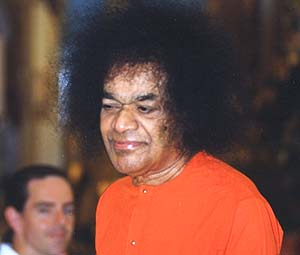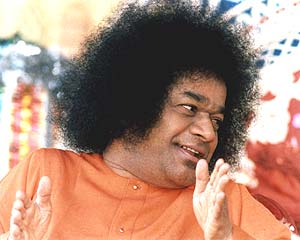 |
 |
 |
Volume
6 - Issue 09
SEPTEMBER - 2008 |
CONVERSATIONS WITH SAI Satyopanishad - part 8:
CHAPTER 3 - YOUTH Anil Kumar: Swami! We go to colleges and universities for studies and acquire knowledge. We take up some employment thereafter. We draw our salaries, but, the pity is whomsoever we meet they say, "I don't have peace of mind”. Why is this so? What is to be done? Bhagavan: Mere education will not give you peace of mind. Sage Vyasa compiled all the Vedas, wrote the great epic Mahabharata, the eighteen Puranas and the Brahmasutras. Yet, his mind was restless; he was without peace. At this stage of Vyasa's anguish, sage Narada advised him to write the Bhagavata, a work, which incorporated the leelas (Divine Sport) of the Lord and life sketches of some of the most outstanding devotees of the Lord who sang the full glory of His miracles.
It was only then that he enjoyed peace and bliss. Neither position, nor status, nor scholarship, nor influence, nor wealth, nor fame - no, none of these achievements can ever give you peace of mind. It can't be received from anyone nor can it be located at a place. No external objects, articles, or possessions can give you peace of mind. The root cause of loss of peace is the bundle of desires. So, I often tell you "less luggage, more comfort, makes travel a pleasure" - the maxim of the Indian Railways. Therefore, a ceiling on desires is most important. Don't feel sad that you don't have koti (one crore of rupees), but be happy that you have enough for roti (food). Don't feel unhappy over not having a car, but be happy that you have a kalu (legs). Don't cry over a scorpion bite, but be happy that you are not bitten by an enormous snake. Don't grieve that a snake has bitten you, but be grateful to God that you didn't die because of that. It is in contentment that peace and happiness are present. Who is the richest man? The man with contentment is the richest man. Who is the poorest man? He who has many desires is the poorest man. Many come to me and say, "I want peace". I tell everyone, "The answer is in your request itself. When you say, “I want peace”, there are two components “I” and “want”. “I” is mamakara or the ego or attachment, and “want” is kama or desire. When you give up these two - ego and desire, peace is already there. Anil Kumar: Swami! Many of us are helpless when we interact with youngsters. They often say, "Don't interfere with us; it is our freedom. We are independent and act in the way we choose." We find it difficult to convince them about what we think is right, and to guide them in the right direction. What should we do in the present circumstances? Bhagavan: From your statement, it is very clear that modern youth do not know what freedom is. They use terms like sveccha, freedom and svatantra, independence, indiscriminately without knowing their correct meaning.
What is freedom? What is independence? If freedom means behaving as we like, without any norms, in what way then are we different from birds and beasts which act as they like? They move about freely without any restrictions. They also procreate producing dozens and dozens of young ones. If that is what the youngsters mean and want by 'freedom', insects, birds, and animals, without attending any universities and getting degrees are able to manage to secure food and shelter and live freely as ordained by nature. Then, in what way does your freedom benefit you? What is your specialty? What is your education for? Animals are better than you, as they have some reason and season. You have neither reason nor season. What is sveccha, freedom? If the Sanskrit word sveccha is analysed properly, it is sva + iccha. Sva means 'yourself', i.e. soul, spirit, Atma, iccha means 'will'. Thus, sva, (Atma) plus iccha, (will), means ‘the will power of Atma (Self)'. So this relates to our Atma. Is it that sveccha that our youngsters want today? The pity is they do not know the meaning of the word they use. Then, modern man says, "I have svatantra, independence, to do anything I like. Can't I be independent?" Here, also youngsters do not know the meaning of svatantra. Does svatantra mean reckless, careless, and irresponsible behaviour? No. If you think that moving and roaming around, eating and drinking anything to your liking, are the signs of independence, don't you see that cats and rats also enjoy themselves in the same manner? Does independence mean food and drink? You are spending your entire lifetime anyway on these two: food and drink. Life has come down to the level of just loading and unloading.
Then, what is svatantra, independence? You have to remember in this context one important point. True, you have independence. But, there is a limit. Your independence should not come in the way of the independence of others. So you have independence up to the point that it does not affect the independence of others. A small example: One gentleman on a fine morning started his stroll, waving his walking stick and swinging it freely. After some time a man passing that way pointed out, "Do not swing your walking stick like that!" Then, this man said, "Why not? I have independence and can move my walking stick in any way I like." But, the other said, "Sir, it is true. But your independence to swing your walking stick ends where my nose begins to appear because while swinging your walking stick, I am afraid, you might hit my nose." This is the limitation of your independence. We also hear people say, "We are celebrating svarajya, Independence Day." Is it true? No. Here, sva means 'self'. Have you mastered yourself? Do you have control over your senses? Usually svatantra means becoming independent of foreign rule. You break the chains of slavery under the yoke of the rulers and declare independence. This is political independence. This is not enough. Spiritually also you should be independent by controlling your senses, conquering your weaknesses and checking your evil tendencies. This is independence in the kingdom of Atma. You become truly independent only after you have conquered desire, lust, greed, anger, hatred, avarice, sense of vengeance, etc. You have to understand the meaning of svatantra in this sense. Anil Kumar: Swami! What is the ideal ambience of a classroom? Bhagavan: You should follow your ancient traditional culture. A student with vinaya, humility, and vidheyata, obedience will be able to acquire thorough knowledge. Students should evince keen interest in the subject they study, and even ask questions. Whenever they have doubts, they should seek clarifications from their teachers.
Therefore, a student should be seated at a lower level than a teacher who occupies his seat at a higher level on a chair. Water always flows downwards, so does knowledge. Fire travels upwards. Similarly, the fire of wisdom of a student travels upwards. Anil Kumar: Swami! Today we find imitation in all spheres of life. In particular, this imitation is very common among youngsters. What does Swami say about it? Bhagavan: Imitation is weakness. This is a defect in the modern youth. Imitation is human, creation is divine. Imitation makes you forget your natural behaviour too. A crow happened to see a swan and was very much attracted by its graceful and dignified gait. The crow started imitating. It started walking slowly for a while, then started jumping and finally was about to fly with the result that it had lost its own way of walking. It looked so awkward and artificial. Therefore, one has to be natural. Imitation is not only unnatural, but also ridiculous. Anil Kumar: Swami! Today many people, particularly youngsters, are wasting their time. Many are lazy, and idle away their precious time. So, in spite of rich resources, the country is not progressing. Kindly suggest a cure for this malady. Bhagavan: There is no dearth of anything in this country. We have sufficient resources. People are also highly resourceful and talented: There is nothing in the world outside which is not here in Bharat (India). As the Kannada saying goes, enna bharate tanna bharati. History tells you that in the past this country was the target of invasions and attacks by many foreigners drawn by the riches and the resources here. But today, we find many lazy people wasting their precious time. Though they draw fat salaries, they don't work proportionately. Thus, the country is betrayed and cheated. You should follow Time. Time will not follow you. God is time, samvatsaraya namah. Time is God. Kalaya namah, kalatitaya namah, kaladarpadamanaya namah are some of the epithets of God, depicting Him as the Master, the Designer and the Controller of Time. The Namavali emphasises this aspect of Divinity. So, if you waste your time, it is a sin. You should spend time in the most sacred way.
I tell the students often: ‘See no evil, see what is good. Speak no evil, speak what is good. Hear no evil, hear what is good. Do no evil, do what is good.’ Therefore, it can be concluded that 'casting evil looks, hearing evil words, talking evil, thinking evil and acting evil', amounts to a waste of time. You should work hard. "Thou shalt live by the sweat of thy brow," says the Holy Bible. But, today it is not like that; people would rather like to have their earnings without putting in any effort. Any work you do, do it with Namasmarana, repeating God's name. This is bhakti marga, the path of devotion. Such work turns itself into an offering to God. This is anubhava jnana or Wisdom borne out of experience or Practical Knowledge. Idle and lazy people can't achieve anything in life. Truly, if you work with both hands, couldn't you feed one stomach? You know how a photographer clicks a camera. He adjusts his lens calculating the distance and asks you to be ready before he clicks. Doesn't he? But, Kaludu, the God of Death, does not give you any time nor does he ask you to be ready as he clicks the camera of life. He takes away your life all of a sudden, unnoticed. So, you should be ever ready to face death. Hence, it is absolutely necessary to make the best use of time in the most sacred way. Observe God's creation: the Sun, the Moon, the Stars and the Planets. All of them move in their orbits so that you have day and night in your life, constituting time. Trees and rivers follow time and are an ideal to humanity. So, it is said that nature is the best teacher. Swami has no holiday. You have at least a Sunday as a holiday during the week. I receive thousands of letters everyday. I read them all. I attend to all my work. I walk miles everyday moving amidst you. I supervise, monitor, guide and direct all matters relating to the University, the Super Specialty Hospital and the Water Project personally, besides thousands of Sai Centres spread all over the world. I don't take rest; I don't have any interval or a holiday. Your happiness is My happiness. God incarnates to show you the ideal way of life. So, don't waste time. By Karma, proper action, uphold Dharma, righteousness, and merge in Brahman (Divinity), and thus redeem your lives. (To be continued)
|
Vol 6 Issue 09 - SEPTEMBER 2008
|
Best viewed in Internet Explorer - 1024 x 768 resolution. |

